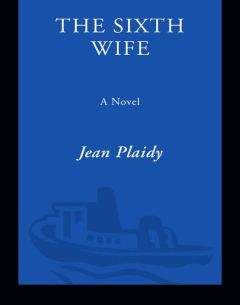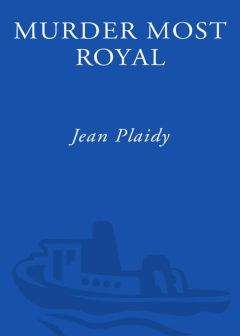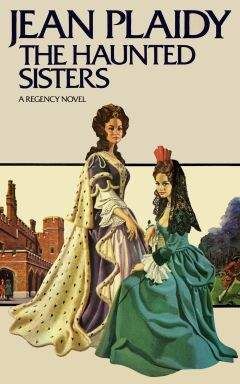Jean Plaidy - The Sixth Wife: The Story of Katherine Parr
На сайте mybooks.club вы можете бесплатно читать книги онлайн без регистрации, включая Jean Plaidy - The Sixth Wife: The Story of Katherine Parr. Жанр: Прочее издательство неизвестно,. Доступна полная версия книги с кратким содержанием для предварительного ознакомления, аннотацией (предисловием), рецензиями от других читателей и их экспертным мнением.
Кроме того, на сайте mybooks.club вы найдете множество новинок, которые стоит прочитать.

Jean Plaidy - The Sixth Wife: The Story of Katherine Parr краткое содержание
The Sixth Wife: The Story of Katherine Parr читать онлайн бесплатно
What is wrong with me? he asked himself. He was getting old, he supposed. He was thirty; he longed for excitement; and he was so reckless that he cared little how he obtained it.
He looked about him for fresh mischief, and his interview with his sister gave him an idea.
SURREY LOST NO TIME. He dressed himself with the utmost care. Sparkling with jewels, haughty in the extreme, he called on Lady Hertford.
Hertford’s wife, who had been Anne Stanhope, was known throughout the court as one of its proudest and most ambitious women. She shared her husband’s ideals and ambitions; she was cold and avaricious. She was waiting with impatience for the day when she should be the first lady in the land. She was determined to gain that status, promising herself that when her husband was Protector of England she would take precedence over every other lady, and if any dared attempt to place themselves before her she would persuade her husband to make arrangements for their removal.
She was greatly surprised to hear that the Earl of Surrey had called to see her.
He bowed low over her hand and looked at her most humbly. She was a very conceited woman, so it gave her great pleasure to see the heir of the most noble house in the country bowing so graciously before her.
“Lady Hertford, I have something of great importance to say to you,” said the incorrigible Earl, “and it is for your ears alone.”
She dismissed her attendants; and as he watched them go, the Earl smiled insolently.
“Lady Hertford,” he said, “you are a fair and gracious woman, and it pleases me to see you occupying such a position in the land.”
“Thank you, my lord Earl,” she said. “But what is this matter of which you would speak to me?”
“I have long watched you, Lady Hertford.”
“You have watched me?”
“With great admiration; and that admiration has grown so strong that I have come to the conclusion that there will be no peace for me until I have revealed it to you.”
She began to regard him suspiciously.
He had come toward her, seized her hand, and pressed it to his lips.
“You are so beautiful,” he said.
“I think, my lord, that you have drunk too freely. I think it would be wise for you to go home.”
“Wise!” replied the poet. “But what is wisdom? It is for the old— a compensation for those whom love has passed by.”
“Love! You speak to me of love!”
“Why not? You enchant me. You delight me. So I come to lay my proposals at your feet, to beg you not to deny me, for I am dying of love for you.”
“I shall be grateful if you will leave at once.”
“I will not until you have heard me.”
“These are my apartments…”
“I know. I know. Your husband’s lowborn sister married the King. By my faith! I have often wondered how she seduced him to marriage. Well, she did, and thus were her lowborn brothers raised to greatness. The King delights in having those about him who are lowborn. Do you know why? It is because he need not fear them. It is the nobles whom he must fear. Look at them: Wolsey, Cromwell, Gardiner and… the Seymours. All lowborn people.”
“How dare you?” cried the enraged lady.
She went toward the door, but he barred the way. He seized her and held her fast, laughing as he did so.
“Do not imagine, my dear Lady Hertford, that my proposal is an honorable one. No, I could not…even if I were in a position to offer you marriage, and you in a position to receive such an offer… make such an offer. It has been suggested that your brother-in-law should marry my sister. But I would not allow that. Marry a Seymour with a Howard! That could not be. There is too great a gulf between our families. But another kind of liaison between your house and mine might be arranged….”
She had broken free and was about to call her servants when she remembered that she could not easily ask them to remove from her apartments such an important nobleman.
She was by no means a hysterical woman and, as she stood there, uncertain how to get rid of him, she was deciding that he should pay for this insult with his life.
There was nothing she could do but walk with dignity to the door. This she did, leaving him alone in the apartment.
Surrey stood watching her leave. He knew that of all the foolish things he had ever done in his life—and they were legion—this was about the most foolish. And he did not care.
He left the apartment. He knew that Hertford would take revenge. But he did not care. He had lost interest in living. There was one thing he would have liked, though; and that was to hear Lady Hertford’s description of the scene which had just taken place when she imparted it to her husband.
IT WAS A COLD December day and the King was now in his royal palace of White Hall.
He was feeling a little better than of late. He had suffered great pain through the cauterization of his legs, but he believed the treatment to have been successful and he was looking forward to the Christmas revels. His mind kept reverting to the past, and he was thinking now of other revels at which he had been the leading spirit. Wistfully he longed for a return of his youth.
It was at such times that he thought much of women, but his fancy did not stay long on any in particular. His wife? He was fond of her. She was a gentle nurse; but it was not always a nurse that he wanted. In any case, he was at this time preparing a charge of heresy against her. Soon he would have her questioned. But let her stay beside him for a while. Then, if she were proved to be a heretic, it was his bounden duty to rid himself of her. She would have to die. He had had two divorces and he did not like them. They were dangerous. A divorced woman might get a child, and rumor might have it that it was his. There had been such a rumor concerning Anne of Cleves. No! Death was the better solution. He did not want trouble for little Edward.
He merely wanted a wife—a young and comely woman to take his mind off his longing for the past.
Hertford begged an audience which the King granted.
“Ah, brother,” said Henry. “You wear an angry look.”
“Your Majesty, I have discovered treason.”
“What treason’s this?”
“My Lord Surrey, your Grace.”
“That braggart? What now?”
“He has foreign friends. Your Grace, we have always known that. There is in his employ an old servant of your enemy, Cardinal Pole. He has tried to persuade his sister, the Duchess of Richmond—Your Grace’s own daughter-in-law—to become Your Grace’s mistress!”
The King burst out: “The rogue! The knave! How dare he suggest such a thing! He should know how I would look upon such a horrible proposal!”
Hertford bowed. “Your Grace is happily married to a lady we all love and respect.”
“Indeed it is so,” said Henry. “How dare the young fool presume to provide me with a mistress! As if I were not capable of finding my own… should I desire one. But I do not. I have tried to uphold the sanctity of marriage. Always this has been my endeavor.”
Henry shot a swift glance at Hertford, but Hertford was looking grave, obsessed by his own anger, his own determination on revenge.
“He conspired, Your Grace, to govern you through his sister.”
That brought the hot blood to the King’s face. “By God, I’ll have him in the Tower for this. The man’s a traitor.”
Now was the moment to clinch the matter. Hertford was wise enough to understand that.
“My lord, in his arrogance, he has had the leopards of England emblazoned on a panel of one of the rooms at Kenninghall.”
“What!” roared Henry.
“It is true, Your Grace. This was discovered by an intimate of his, who, having seen that such amounted to treason, felt that he himself would be considered guilty if he did not report it.”
“It is treason!” cried Henry. “What right has he to bear the arms of England?”
“He said, when challenged, that he has a right to those arms, for the blood of Charlemagne and Plantagenet flows in his veins.”
“By God!” cried the King, rising and leaning on his stick. “He shall suffer for that!”
“He considers himself more royal than Your Grace. He and his father are both guilty of treason.”
“Norfolk also? What has he done?”
“He has seen the royal escutcheon on that panel at Kenninghall and has not testified against his son.”
“Aye,” said the King. “Aye.”
“And Your Grace will remember that he wished to marry his son to the Princess Mary. They are dangerous, those Howards. They are traitors.”
“Traitors!” snapped Henry. “Brother, you speak truth.” He was remembering the mocking brown eyes of England’s greatest poet; he was hearing the words which flowed so easily from the haughty lips. He pictured also the royal arms on a panel in Surrey’s mansion; and he foresaw the trouble that important house might bring to his little son, who was but nine years old.
“To the Tower!” he cried. “To the Tower with these traitors!”
And he brooded: I will not die. I will live yet. I will beget more sons. Edward is too young. I will not die until he has brothers growing up about him.
Hertford left gleefully with the King’s command. Henry promised himself that when these affairs were done with, and Norfolk and Surrey had lost their heads, he would, without further delay, have that charge brought against the Queen.
He would have a buxom wife—the seventh and the best; and she should bear him many sons in the years that were left to him.
SIR THOMAS SEYMOUR rode out to Hatfield House, where the Princess Elizabeth now lived with her brother Edward.
Thomas knew that the children were to be separated and that the following day Edward would be sent to Hertford Castle and Elizabeth to Enfield. These were the King’s orders. It might be that His Majesty believed the young Elizabeth to have too strong an influence on the boy.
Thomas felt pleased as he rode through the countryside. He saw the house in the distance and thought longingly of Elizabeth. He guessed that she might be watching his approach, from a window; but if she were, she would feign surprise at his arrival.
She was sharp for her thirteen years and was no doubt watching events as eagerly as any.
A groom took his horse, and he went into the house. He was received by the tutors of the royal children, Sir John Cheke, Dr. Cox and Sir Anthony Cooke.
“Greetings, gentlemen!” he cried in his jaunty way. “I hear there is to be a parting between our Prince and Princess; and I have ridden hither to see them both while under the same roof.”
“They will welcome your coming, Sir Thomas. The Prince speaks of you often and has been wondering when you will come to see him.”
“And the Princess?”
“She has not spoken of you, but I dare swear she will have pleasure at the sight of you.”
He went to the apartment where the young Prince and his sister were together. There were traces of tears on the faces of both.
Thomas knelt before the heir to the throne and kissed his hand.
“Uncle Thomas!” cried Edward. “Oh, how glad I am to see you!”
“Your Highness is gracious,” said Thomas. He turned to Elizabeth. “And the Lady Elizabeth, is she pleased to see me?”
She gave him her hand and let it linger in his while he fervently kissed it.
“You come, my lord, at a sad time,” she said.
“We have been so happy here,” said Edward passionately, “but we are to be parted. I am to be sent to Hertford, and my sister to Enfield. Oh why, why?”
“Those are your royal father’s commands,” said the Admiral. “I doubt not that he hath good reason.”
He thought how fair she was, this little girl who, in spite of her slender child’s body—she was too restless of mind to put on flesh— had all the ways of a woman.
“I have wept,” said Elizabeth, “until I have no tears left.”
Thomas smiled. She had not wept so much that the tears had spoiled her prettiness. She would have wept discreetly. It was the poor little Prince who was heartbroken at the prospect of their separation. Elizabeth’s tears had been a charming display, an outward sign of the affection she bore to one who soon—surely very soon—must be King of England.
“We have been so happy,” persisted the Prince. “We love Hatfield, do we not, sister?”
“I shall always love Hatfield. I shall remember all the happy days I have spent here, brother.”
Hatfield! mused Seymour. A lovely place. A fitting nursery for the royal children. The King had taken a fancy to it and had intimated to the Bishop of Ely, to whom it had belonged, that he should present it to his royal master. It was true that His Majesty had given the Bishop lands in exchange, but one’s possessions were not safe when such covetous eyes were laid upon them.
And as she stood there, with the faint winter light on her reddish hair, in spite of the fact that she was a girl and a child, she reminded the Admiral of her father.
But I’ll have her, he swore. If I wait for years I’ll have her.
And so did he believe in his destiny, that he was sure this thing would come to pass.
The Prince dismissed his attendants, and the Admiral sat on the window seat, the Prince on one side of him, the Princess on the other; and never did he take such pains to exert his charms as he did on that day.
“My dear Prince, my dearest Princess,” he said, “you are so young to be parted. If I had my way I should let you do exactly as you wished.”
“Oh, Uncle Thomas, dearest Uncle Thomas,” said the Prince, “if only you had your way! Have you seen Jane? I see her so rarely now.”
“She is happy at court with the Queen.”
“I know. She would be happy with our dearest mother. But how I wish she could be with me. And now they would take Elizabeth from me.”
“It may not be for long,” said the Admiral recklessly, yet deliberately indiscreet.
The two children looked at him in astonishment.
“My dears, forget those words,” he said. “By God’s precious soul, I should never have uttered them. It is tantamount to treason. Would you betray me, Edward?”
“Never! Never! I would rather die than betray you, dearest Uncle.”
He put his arm about the boy and, holding him, turned to Elizabeth.
“And you, my lady, would you betray poor Thomas?”
She did not answer for a moment. She lowered her silky lashes so that he could not see her eyes. He put his unengaged arm out to seize her.
He said: “Edward, I’ll not let her go until she swears she will not betray me.”
To the boy it was horseplay, in which Uncle Thomas Seymour loved to indulge.
Her face close to his, Elizabeth said: “No. No. I do not think I would betray you.”
“And why is that?” he asked, putting his lips near hers.
He now held the children tightly. Edward was laughing, loving the man who made him forget the difference in their ages.
“Perhaps,” said Elizabeth, “it might be that I like you well enough not to.”
“Too well?” said the Admiral.
She lifted her eyes to his and hers were solemn with the faintest hint of adoration.
The Admiral’s hopes were soaring as she said: “That might be so.”
Похожие книги на "The Sixth Wife: The Story of Katherine Parr", Jean Plaidy
Jean Plaidy читать все книги автора по порядку
Jean Plaidy - все книги автора в одном месте читать по порядку полные версии на сайте онлайн библиотеки mybooks.club.




